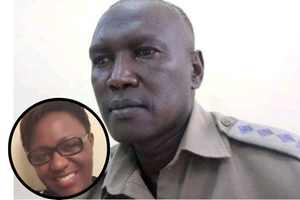
A police officer is shown how to use a speed and night camera.
Reports of police transgressions in public, against the public, and allegations of extra-judicial killings continue in Kenya despite calls to kit the police with body cameras.
I wonder why the government is finding it difficult to ensure every police officer wears a body camera while on duty! Billions continue to be spent on unnecessary infrastructure, never-ending foreign travels and employing more politicians in the name of serving Kenyans but there is little effort being put into ensuring that the police can serve the public in a transparent manner by wearing body cameras.
Police cameras are not just for protecting the public but also the police officers themselves. It is a form of deterrent that tends to be overlooked in Kenya. The recent incidences of attacks on the police by the public would not have happened perhaps had the public been aware that the police wear body cameras. They can also reduce crime and cases of anti-social behaviour because the public would be primed to know that the police record evidence on the body cameras and can be used against them in court.
Research by UK’s College of Policing found that ‘body cameras reduced complaints against the police’. In similar research, University of Cambridge’s School of Criminology discovered that the complaints against the police reduced by a ‘startling 93 percent’! It also found that the use of body cameras had ‘profound sea change in modern policing’.
The National Police Service has a long way to go in modernising and adopting technology when tackling crime. Holding on to the old model of policing is playing into the hands of corrupt police officers. Cases of bribery by the police, assaults, extra-judicial killings and even robbery by police will continue the longer the government fails to modernise police operations.
Evidence collected in Kenya is still kept in brick-and-mortar stores, which takes up so much space that could be utilised better by the officers. It is essential to store some tangible evidence in a building but most evidence now can be stored digitally. Evidence collected by the body cameras could easily be transferred to the computer servers for safe-keeping.
Tamper-proof
Evidence can also be made tamper-proof, unlike traditional paper filing systems, which are open to sabotage by corrupt police officers and easily lost or burnt. It is easy to follow the trail of computer users and know the culprits within the police stations who tamper with evidence and punish them.
Cases of suspects disappearing from police stations could also be eradicated if cameras were used in the police cells and worn by police officers manning the stations and working within the cells. Body cameras are key in collecting intelligence that police could use to deter acts of criminality or even threats to national security.
The violence being perpetrated against police officers by civilians could be reduced significantly if body cameras were used. Civilians would be forced to think twice before attacking police officers. The bad blood between the police and the public is also exacerbated by heavy handed way the police have been dealing with the public. Furthermore, cases of police assaulting or even killing civilians unlawfully have been difficult to prove due to lack of evidence. Body cameras would be crucial in such cases to get justice for abuse of power by the police.
Traffic police have been notorious in ambushing and forcing themselves into civilians’ cars in pursuit of bribes and this has led to a lot of problems and concerns relating to the conduct of both parties. It is difficult to challenge such rogue police officers due to lack of video evidence that has become crucial in other countries to curb the excesses of police authority.
Road accidents
Body cameras would in fact minimise cases of road accidents and other breaches of traffic laws if drivers know that they are being watched by both the cameras on the roads and streets and those worn on the bodies of police officers. Many Kenyans think body cameras won’t work because the police in Kenya are corrupt and will interfere with them, but that is the responsibility of the government to ensure that abuse of the cameras does not happen in the first place and stiffer penalties are issued against police officers who interfere with policing cameras.
The tension between the police and members of the public is made worse by the government due to its inaction in improving the welfare of the officers and investing in important tools such as body cameras to end crime and create harmony between the police and the public.
Modernising the National Police Service is not rocket science. It just needs investment and genuine focus to want to improve the relationship between the public and the police. If the government is serious about ending crime, then it must walk the talk and kit the police with body cameras to help improve police work and create harmony in society.
Ms Guyo is a legal researcher, [email protected], @kdiguyo








